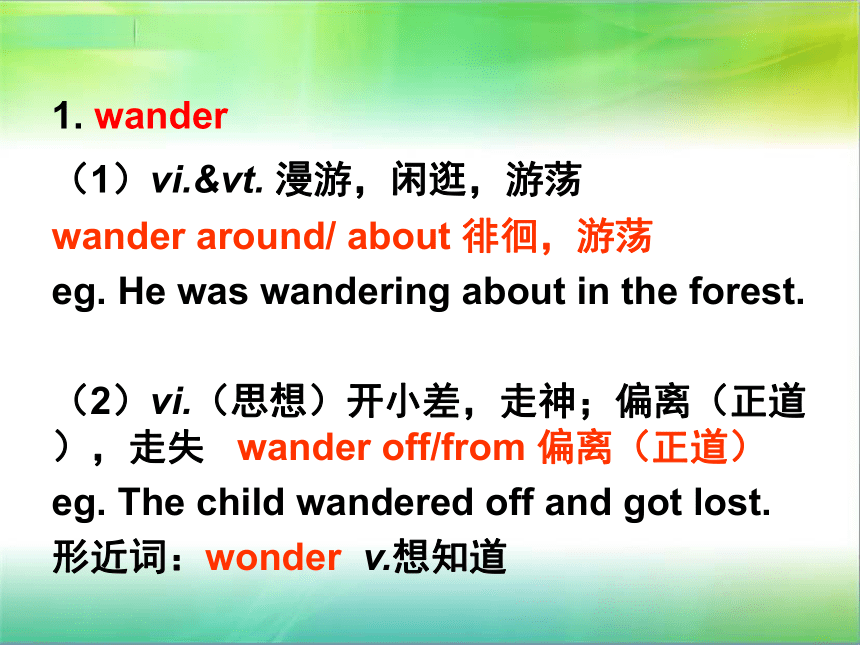2人教版必修3 Unit3 The Million Pound Bank Note Language points课件(15张PPT)
文档属性
| 名称 | 2人教版必修3 Unit3 The Million Pound Bank Note Language points课件(15张PPT) |  | |
| 格式 | zip | ||
| 文件大小 | 89.3KB | ||
| 资源类型 | 教案 | ||
| 版本资源 | 人教版(新课程标准) | ||
| 科目 | 英语 | ||
| 更新时间 | 2020-04-07 06:45:12 | ||
图片预览






文档简介
(共13张PPT)
Unit 3 New words
1. wander
(1)vi.&vt. 漫游,闲逛,游荡
wander around/ about 徘徊,游荡
eg. He was wandering about in the forest.
(2)vi.(思想)开小差,走神;偏离(正道),走失 wander off/from 偏离(正道)
eg. The child wandered off and got lost.
形近词:wonder v.想知道
2. go ahead
(1)表示同意对方的请求“说吧,做吧,开始吧,进行吧”
-Can I use your computer?
-Yes, go ahead.
(2)表示请对方继续说、继续做“继续......吧”
-Don't interrupt me when I am talking.
-OK, go ahead.
(3)表示请对方先走或做某事“先走,先行”
You go ahead. I'll follow you.
3. fault
(1)n. 过错,责任,过失
If my memory is not at fault, it was Saturday.
(2)n. 缺点;毛病,缺陷,故障
find fault with...挑......的错,找......的岔
Don't always find fault with others.
be at fault 有过错;有责任
be one's fault 是某人的错
4. passage n. 船费(包括食宿)
她的祖父一路不得不靠打工支付船费来到美国。
Her grandfather had to work for his passage to America.
通道/通路,走廊
章节,段落 a passage from the Bible
5. patience n. 耐性;忍耐
be (run) out of patience with... 对......没有耐性
lose patience with... 对......失去耐性
patient adj. 有耐心的,能容忍的
n. 病人,病患
impatient adj. 没有耐心的
patiently adv. 耐心地
6. amount n. 数量,数额;金额
a large / great / good / small amount of +不可数名词
大量的/少量的......(作主语是,谓语动词用单数)
large / small amounts of +不可数名词
大量的/少量的......(作主语是,谓语动词用复数)
the amount of +不可数名词 ......的总数(作主语时,谓语动词用单数)
eg. The amount of money he spent every month is increasing.
7.take a chance (=take chances)
=take one's chance=take a risk “冒险”
eg. I want to take a chance and run a business.
by chance
(the)chances are that... 很可能......
have a chance to do sth./ of doing sth. 有可能做某事
There is a chance that... 有可能......
There is a / little / no chance of...有可能/几乎没有可能/没有可能......
8.rude adj. 粗鲁的;无礼的
be rude to sb. / sth. 对某人/某物很粗鲁/无礼
It's rude of sb. to do sth. 某人做某事是很无礼的
rudely adv. 无礼地;粗暴地
rudeness n. 无礼;粗蛮
9.manner n.
(1)举止,行为方式。通常用单数,与介词to/ toward 连用。
eg. His manner toward(s) us was kind.
(2)方式,方法。常用单数,前面通常有形容词对其进行修饰。
eg. We speak to each other in a friendly manner now.
in a(n)... manner以......方式
in this manner 以这种方式
(3)礼貌,礼仪;习俗,规矩。通常用复数形式,作主语时谓语动词用复数。
It's bad manners to leave without saying goodbye.
table manners 餐桌礼仪
have good / bad manners 有/没有礼貌
It's good / bad manners to do sth.
10. in rags “衣衫褴褛;穿的破旧” 常作定语或表语
eg. The old man in rags begged from door to door.
Look at the man who is in rags. He is begging for food.
Homework
1. 记会第三单元单词 P96 and P97
(家长听写)
2. 作文:对于金钱的认识 (100 words)
3. 观看英文电影《百万英镑》
Unit 3 New words
1. wander
(1)vi.&vt. 漫游,闲逛,游荡
wander around/ about 徘徊,游荡
eg. He was wandering about in the forest.
(2)vi.(思想)开小差,走神;偏离(正道),走失 wander off/from 偏离(正道)
eg. The child wandered off and got lost.
形近词:wonder v.想知道
2. go ahead
(1)表示同意对方的请求“说吧,做吧,开始吧,进行吧”
-Can I use your computer?
-Yes, go ahead.
(2)表示请对方继续说、继续做“继续......吧”
-Don't interrupt me when I am talking.
-OK, go ahead.
(3)表示请对方先走或做某事“先走,先行”
You go ahead. I'll follow you.
3. fault
(1)n. 过错,责任,过失
If my memory is not at fault, it was Saturday.
(2)n. 缺点;毛病,缺陷,故障
find fault with...挑......的错,找......的岔
Don't always find fault with others.
be at fault 有过错;有责任
be one's fault 是某人的错
4. passage n. 船费(包括食宿)
她的祖父一路不得不靠打工支付船费来到美国。
Her grandfather had to work for his passage to America.
通道/通路,走廊
章节,段落 a passage from the Bible
5. patience n. 耐性;忍耐
be (run) out of patience with... 对......没有耐性
lose patience with... 对......失去耐性
patient adj. 有耐心的,能容忍的
n. 病人,病患
impatient adj. 没有耐心的
patiently adv. 耐心地
6. amount n. 数量,数额;金额
a large / great / good / small amount of +不可数名词
大量的/少量的......(作主语是,谓语动词用单数)
large / small amounts of +不可数名词
大量的/少量的......(作主语是,谓语动词用复数)
the amount of +不可数名词 ......的总数(作主语时,谓语动词用单数)
eg. The amount of money he spent every month is increasing.
7.take a chance (=take chances)
=take one's chance=take a risk “冒险”
eg. I want to take a chance and run a business.
by chance
(the)chances are that... 很可能......
have a chance to do sth./ of doing sth. 有可能做某事
There is a chance that... 有可能......
There is a / little / no chance of...有可能/几乎没有可能/没有可能......
8.rude adj. 粗鲁的;无礼的
be rude to sb. / sth. 对某人/某物很粗鲁/无礼
It's rude of sb. to do sth. 某人做某事是很无礼的
rudely adv. 无礼地;粗暴地
rudeness n. 无礼;粗蛮
9.manner n.
(1)举止,行为方式。通常用单数,与介词to/ toward 连用。
eg. His manner toward(s) us was kind.
(2)方式,方法。常用单数,前面通常有形容词对其进行修饰。
eg. We speak to each other in a friendly manner now.
in a(n)... manner以......方式
in this manner 以这种方式
(3)礼貌,礼仪;习俗,规矩。通常用复数形式,作主语时谓语动词用复数。
It's bad manners to leave without saying goodbye.
table manners 餐桌礼仪
have good / bad manners 有/没有礼貌
It's good / bad manners to do sth.
10. in rags “衣衫褴褛;穿的破旧” 常作定语或表语
eg. The old man in rags begged from door to door.
Look at the man who is in rags. He is begging for food.
Homework
1. 记会第三单元单词 P96 and P97
(家长听写)
2. 作文:对于金钱的认识 (100 words)
3. 观看英文电影《百万英镑》
同课章节目录
